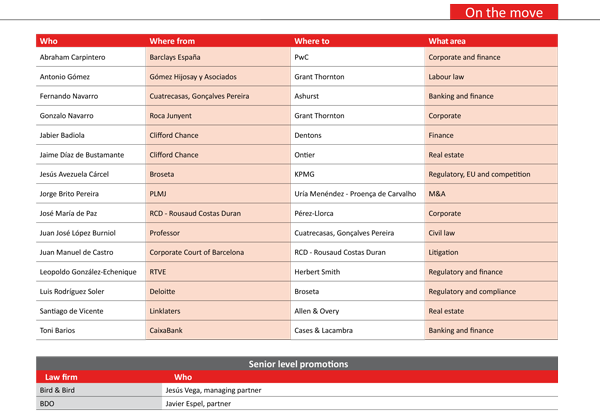Law firms must give certainty on fees
External lawyers must stop thinking about clocking up hours because it gives the impression that they don´t care about their clients, says Andrade Gutierrez’s Pedro Vidigal Monteiro
One of the things that Pedro Vidigal Monteiro – who works as Africa, Asia and Europe legal counsel at Andrade Gutierrez – believes that law firms must change is the “taxi meter” mentality of clocking up hours. “Clients want to know how much they will have to spend on an issue and sometimes with hourly rates that it is an impossible task,” he says. “We recently had one example where a law firm gave us an estimate of 60 hours work for a specific case, but when the final bill came in, the invoice was for almost 200 hours.”
This type of mentality can sometimes be a problem, especially for a company such as Andrade Gutierrez, according to Vidigal Monteiro. “This is because the company has budgets that are always controlled,” he adds. The business law function is divided between Brazil, Latin America, and Europe, Africa and Asia – with the company’s legal team handling operations for Europe, Africa and Asia from the organisation´s Portugal office. The company’s wide range of locations, as well as its numerous business lines – which cover sectors such as infrastructure, energy, health and sanitation among others – mean that its legal spend needs to be monitored closely, Vidigal Monteiro says.
Keep talking to the client
Communication from law firms about possible increases to the fees that were initially proposed is key, according to Vidigal Monteiro, who says that firms that do not keep their clients updated give the impression that they are not considering their interests. “I appreciate that occasionally things may require a bit more work, I’ve been on that side, but even if fees are not capped I would expect a law firm to keep me informed,” he says. “It can appear like a firm does not care about the impact of inflated figures on the client or that the client has a budget.”
In the case of Andrade Gutierrez, the company has approved budgets for each department, and, like many other companies, it continuously reviews these budgets. “Law firms need to become more like business partners and realise what is in the best interest of clients,” Vidigal Monteiro observes. “It is not about billing for every email or phone call, or producing ten pages of advice that will not solve the client’s problem.”
Vidigal Monteiro says Andrade Gutierrez’s preference for such partnerships with external firms applies to all practice areas and jurisdictions in which the company operates. For example, specialist matters such as litigation, tax and projects – notably multi-party projects that require the company to form a joint venture or special purpose vehicle – are outsourced to external firms. While Andrade Gutierrez does have some preferred law firms – though Vidigal Monteiro declines to name them – it is the international spread of the work that is a challenge. “Angola has been one of the most important markets for us, but Algeria, Ghana, Congo, Nigeria and Mozambique are also very important for the company” he adds. “Such jurisdictions require not just knowledge of the local law – the legislation can sometimes be very easy to find in some countries like Angola and Mozambique, though in other countries it can be almost impossible – but the local customs, nuances and etiquettes.” Vidigal Monteiro explains that this means the company often uses a mixture of in-house resources along with international and local law firms, “depending on the matter and the country”.
Need for flexibility
Vidigal Monteiro – who previously worked in private practice in Mozambique – highlights the example of Angola. He says that he personally handles around 95 per cent of Andrade Gutierrez´s legal work in the country, but that there are always some issues, such as litigation, which often require additional help.
Indeed, the remit of the company´s legal work is expanding because the international priorities of Andrade Gutierrez sometimes change, meaning that the in-house legal team has to be quite flexible in its approach to different markets and different challenges. Vidigal Monteiro highlights the slowdown of traditional European markets as one of the reasons for the change in the company´s focus.
However, Vidigal Monteiro concludes that companies are under pressure to “do more and do better with fewer resources”. He adds: “The biggest challenge for the upcoming years will be being flexible and creative enough to adapt to new structures – obviously law firms will have a big role on this.”
Pedro Vidigal Monteiro is Africa, Asia and Europe legal counsel at Andrade Gutierrez












